人教版(2019)必修第二册Unit 4 History and traditions Reading and T hinking课件(19张PPT)
文档属性
| 名称 | 人教版(2019)必修第二册Unit 4 History and traditions Reading and T hinking课件(19张PPT) |
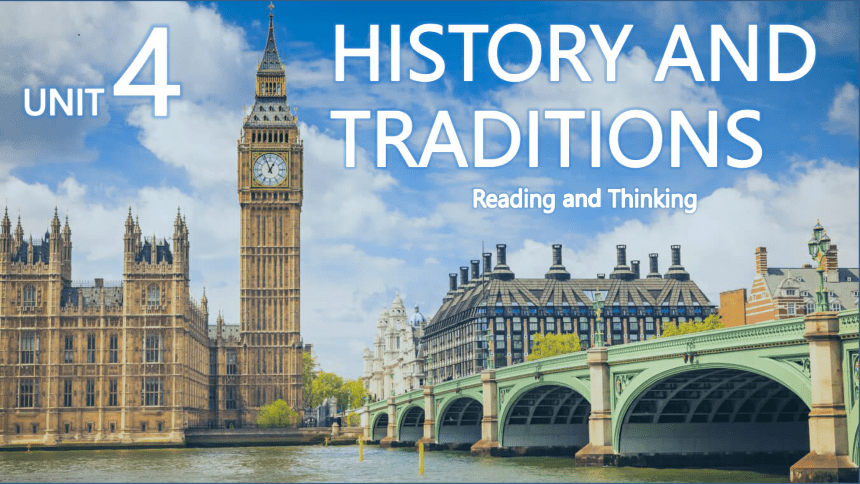
|
|
| 格式 | zip | ||
| 文件大小 | 5.2MB | ||
| 资源类型 | 教案 | ||
| 版本资源 | 人教版(2019) | ||
| 科目 | 英语 | ||
| 更新时间 | 2022-12-20 16:49:38 | ||
图片预览

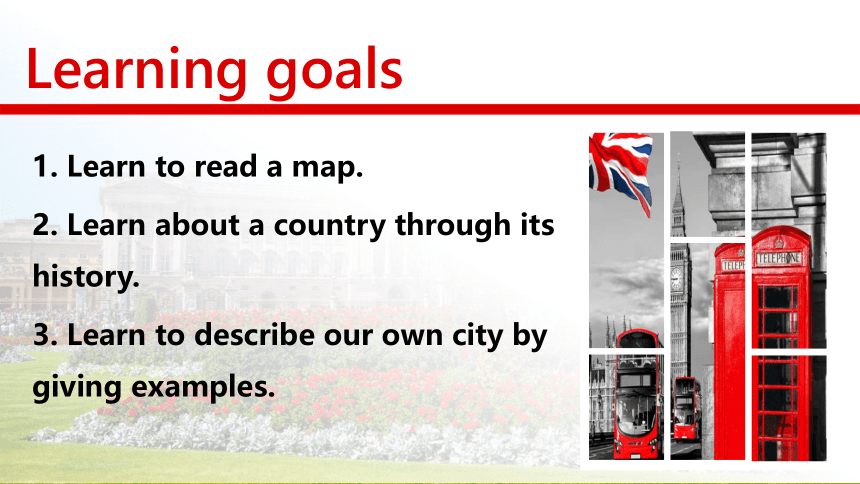
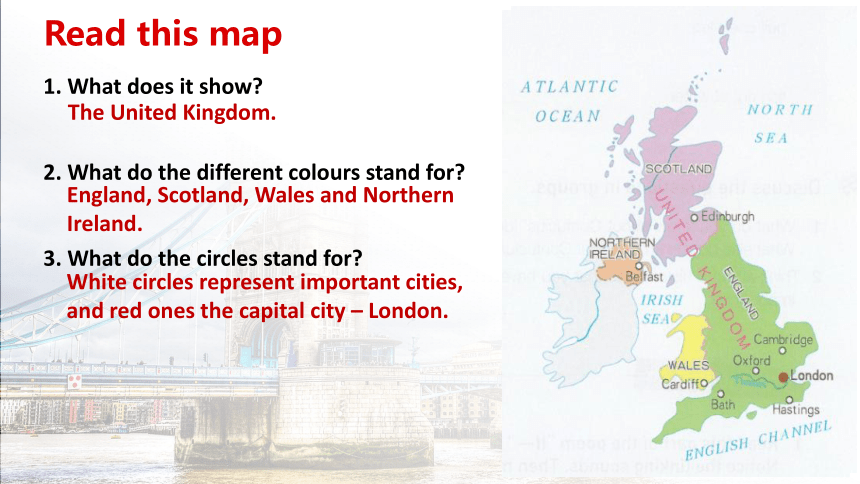
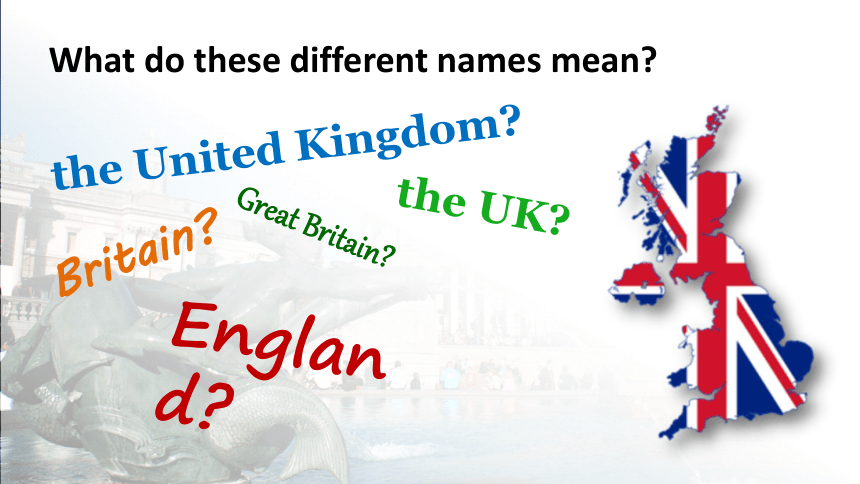
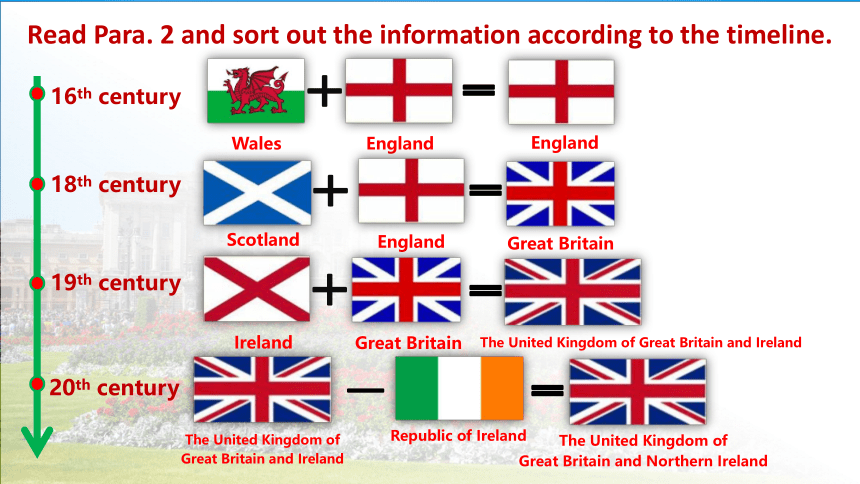
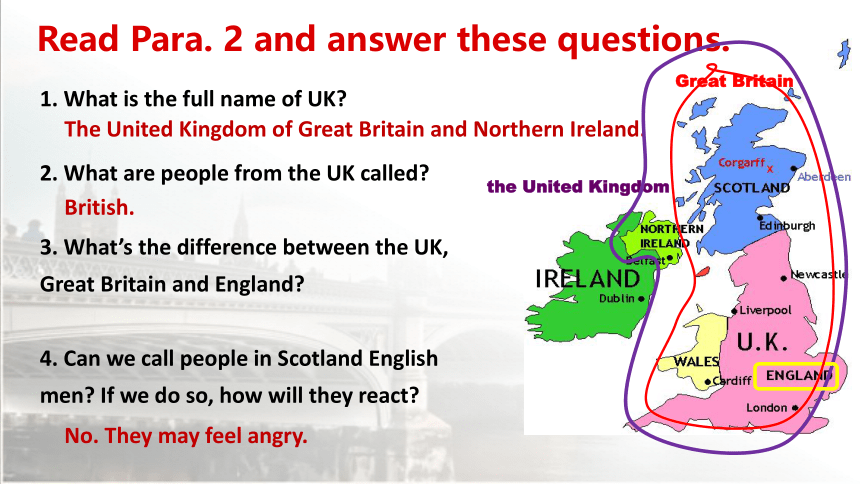
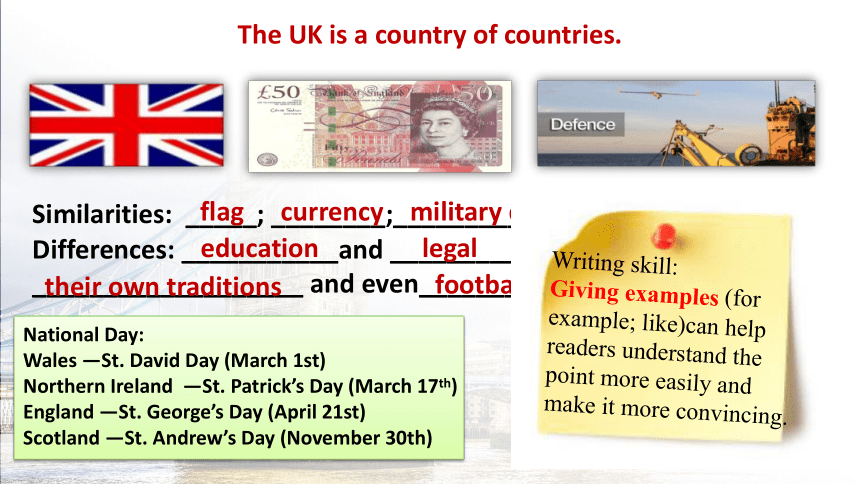
文档简介
(共15张PPT)
HISTORY AND TRADITIONS
UNIT 4
Reading and Thinking
Learning goals
1. Learn to read a map.
2. Learn about a country through its history.
3. Learn to describe our own city by giving examples.
Read this map
1. What does it show
2. What do the different colours stand for
3. What do the circles stand for
The United Kingdom.
England, Scotland, Wales and Northern Ireland.
White circles represent important cities, and red ones the capital city – London.
Great Britain
the United Kingdom
England
Britain
What do these different names mean
the UK
Read Para. 2 and sort out the information according to the timeline.
16th century
England
18th century
19th century
20th century
Wales
England
Scotland
England
Great Britain
Great Britain
Ireland
The United Kingdom of Great Britain and Ireland
Republic of Ireland
The United Kingdom of
Great Britain and Northern Ireland
The United Kingdom of
Great Britain and Ireland
1. What is the full name of UK
2. What are people from the UK called
3. What’s the difference between the UK, Great Britain and England
4. Can we call people in Scotland English men If we do so, how will they react
Read Para. 2 and answer these questions.
The United Kingdom of Great Britain and Northern Ireland.
British.
No. They may feel angry.
the United Kingdom
Great Britain
Similarities: _____; ________;________________
Differences: ___________and __________ systems; ___________________ and even______________ for competitions.
currency
flag
military defence
education
legal
their own traditions
football teams
National Day:
Wales —St. David Day (March 1st)
Northern Ireland —St. Patrick’s Day (March 17th)
England —St. George’s Day (April 21st)
Scotland —St. Andrew’s Day (November 30th)
The UK is a country of countries.
Writing skill:
Giving examples (for example; like)can help readers understand the point more easily and make it more convincing.
What is the advantage of studying the history of a country
To help you understand more about the country and its traditions.
Read Paragraph 4 and sort out the information according to the timeline.
When What happened What changed
Romans arrived
Anglo-Saxons came
Vikings came
11th century
1st century
5th century
8th century
Normans conquered
England after the Battle
of Hastings
towns and roads
language and the way
houses were built
castles built, legal system
changed and new words
from French introduced
vocabulary and names of
locations across the UK
What are the advantages of studying the history of a country
① To help you understand more about the country and its traditions.
② To make your visit much more enjoyable.
The capital city London is a great place to start, as it is an ancient port city that has a history dating
all the way back to Roman times. There are countless historic sites to explore, and lots of museums with ancient relics from all over the UK.
The capital city London is a fascinating place to start, as it is an ancient port city that has a history dating all the way back to Roman times. There are countless historic sites to explore, such as St. Paul’s Cathedral which contains statues in memory of dead poets and writers. There are also lots of museums with ancient relics from all over the UK and even the world. For example, the British Museum boasts a variety of treasures from ancient Greece, Egypt and China.
Read two versions and choose a better one.
Writing skill:
Giving examples (for example; like)can help readers understand the point more easily and make it more convincing.
Which city do you think is a great place for foreign visitors to enjoy in China Introduce it.
WHAT'S IN A NAME
In a name, there is _________________.
a history
culture & tradition
politics
geography
…
Learning goals
1. Learn to read a map.
2. Learn about a country through its history.
3. Learn to describe our own city by giving examples.
Homework
Discuss the questions in Pair. (Page 41; Activity 5)
A people without the knowledge of their past history, origin and culture is like a tree without roots.
—— Marcus Garvey
HISTORY AND TRADITIONS
UNIT 4
Reading and Thinking
Learning goals
1. Learn to read a map.
2. Learn about a country through its history.
3. Learn to describe our own city by giving examples.
Read this map
1. What does it show
2. What do the different colours stand for
3. What do the circles stand for
The United Kingdom.
England, Scotland, Wales and Northern Ireland.
White circles represent important cities, and red ones the capital city – London.
Great Britain
the United Kingdom
England
Britain
What do these different names mean
the UK
Read Para. 2 and sort out the information according to the timeline.
16th century
England
18th century
19th century
20th century
Wales
England
Scotland
England
Great Britain
Great Britain
Ireland
The United Kingdom of Great Britain and Ireland
Republic of Ireland
The United Kingdom of
Great Britain and Northern Ireland
The United Kingdom of
Great Britain and Ireland
1. What is the full name of UK
2. What are people from the UK called
3. What’s the difference between the UK, Great Britain and England
4. Can we call people in Scotland English men If we do so, how will they react
Read Para. 2 and answer these questions.
The United Kingdom of Great Britain and Northern Ireland.
British.
No. They may feel angry.
the United Kingdom
Great Britain
Similarities: _____; ________;________________
Differences: ___________and __________ systems; ___________________ and even______________ for competitions.
currency
flag
military defence
education
legal
their own traditions
football teams
National Day:
Wales —St. David Day (March 1st)
Northern Ireland —St. Patrick’s Day (March 17th)
England —St. George’s Day (April 21st)
Scotland —St. Andrew’s Day (November 30th)
The UK is a country of countries.
Writing skill:
Giving examples (for example; like)can help readers understand the point more easily and make it more convincing.
What is the advantage of studying the history of a country
To help you understand more about the country and its traditions.
Read Paragraph 4 and sort out the information according to the timeline.
When What happened What changed
Romans arrived
Anglo-Saxons came
Vikings came
11th century
1st century
5th century
8th century
Normans conquered
England after the Battle
of Hastings
towns and roads
language and the way
houses were built
castles built, legal system
changed and new words
from French introduced
vocabulary and names of
locations across the UK
What are the advantages of studying the history of a country
① To help you understand more about the country and its traditions.
② To make your visit much more enjoyable.
The capital city London is a great place to start, as it is an ancient port city that has a history dating
all the way back to Roman times. There are countless historic sites to explore, and lots of museums with ancient relics from all over the UK.
The capital city London is a fascinating place to start, as it is an ancient port city that has a history dating all the way back to Roman times. There are countless historic sites to explore, such as St. Paul’s Cathedral which contains statues in memory of dead poets and writers. There are also lots of museums with ancient relics from all over the UK and even the world. For example, the British Museum boasts a variety of treasures from ancient Greece, Egypt and China.
Read two versions and choose a better one.
Writing skill:
Giving examples (for example; like)can help readers understand the point more easily and make it more convincing.
Which city do you think is a great place for foreign visitors to enjoy in China Introduce it.
WHAT'S IN A NAME
In a name, there is _________________.
a history
culture & tradition
politics
geography
…
Learning goals
1. Learn to read a map.
2. Learn about a country through its history.
3. Learn to describe our own city by giving examples.
Homework
Discuss the questions in Pair. (Page 41; Activity 5)
A people without the knowledge of their past history, origin and culture is like a tree without roots.
—— Marcus Garvey
